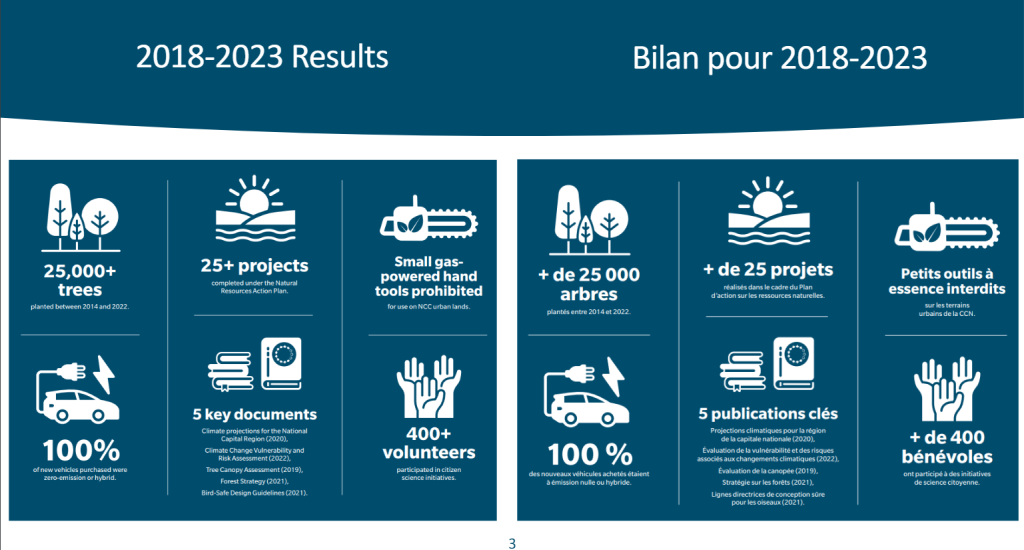The National Capital Commission (NCC) has tabled this year’s Sustainable Development Strategy (SDS) Report, the first annual report under the 2023-2027 cycle.
According to the NCC, it has 24 targets pending completion, eight have been achieved and one was missed.
The government organization’s priority is to “demonstrate national leadership in achieving an environmentally sustainable and climate-resilient National Capital Region.”
It has set some goals to review that will help with planning, decision making and operations over the next several years.
The annual report highlights the organization’s sustainable development and climate resilience achievements for the 2023–2024 fiscal year, with the exception of greenhouse gas (GHG) emission results, which cover the 2022–2023 period.

It’s allocating $7.5 million over five years, in efforts to support its priority of sustainable development, including the implementation of the Sustainable Development Strategy 2023-2027.
While stepping towards the targets, there will be consultations with internal and external stakeholders, the public, partners and First Nations.
“This year’s progress report stands as a testament to our collective efforts, with tangible strides made toward net-zero carbon operations, the adoption of a Climate Adaptation Plan, the expansion of the Gatineau Park shuttle bus, and the protection of ecological corridors for conservation purposes,” Tobi Nussbaum, Chief Executive Officer of the NCC, said.
As the NCC focuses on planning projects that will unfold in the coming years, the 2023-2024 fiscal year marked the transition between the actions of the SDS 2018–2023 and the new commitments made under the SDS 2023–2027, said the National Capital Commission.
“These actions span across key themes of reconciliation with Indigenous peoples, sustainable and active transportation, access to urban green spaces, responsible consumption, climate action, regional food production, affordable housing, and nature and wildlife conservation,” Nussbaum said.
Only five months after adopting the new strategy, it has made significant progress, with eight targets already achieved.
However, the target for action regarding diversion of public waste from the Rideau Canal Skateway was not achieved for the 2023–2024 season, noted the NCC.

Based on the report, as of March 31, 2024, the NCC has made progress on:
Sustainable community
- Improvement to the green space adjacent to the NCC River House
- Increase in ridership on the Gatineau Park shuttle program by 19 per cent in 2023, compared with 2022
- Participation of over 320 citizen volunteers in the NCC citizen science programs in Gatineau Park and support for research
Responsible consumption
- Acquisition of the first three all-electric trucks for the NCC fleet, used by the conservation officer team and operational teams in the Quebec Urban Lands, Gatineau Park, Ontario Urban Lands and the Greenbelt
- Remediation of an additional 0.73 hectares of Victoria Island, as part of the Federal Contaminated Sites Action Plan
Climate action
- The NCC has reduced its greenhouse gas emissions by 54% since 2005-2006
- Development of the first net-zero roadmap for the NCC’s real estate portfolio
- Progress in the NCC’s vehicle fleet, which now includes 23% zero-emission light commercial vehicles
- Adoption of a Climate Adaptation Plan
Natural capital
- Training of key NCC employees in safe bird handling practices and monitoring of collisions near buildings
- Financial support for the NCC to protect 17 hectares of forest within the Larrimac Ecological Corridor, adjacent to Gatineau Park
Culture of sustainability
- Review of the Sustainable Development Policy
- Themed booth at the NCC Open House and hosting of a regional workshop on sustainable development and climate action
- Development of a management and implementation framework for the Sustainable Development Strategy